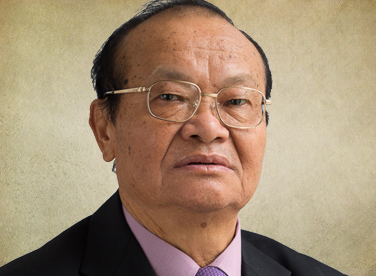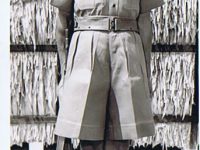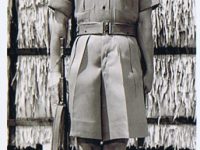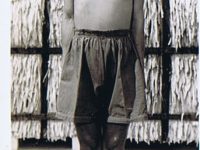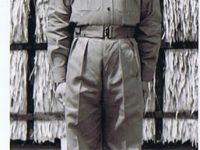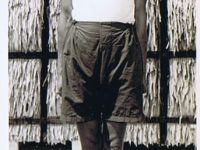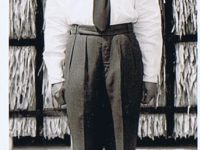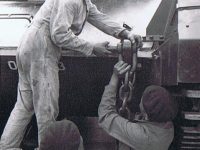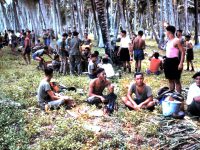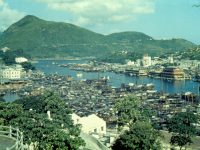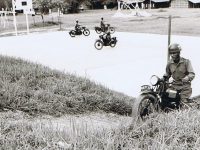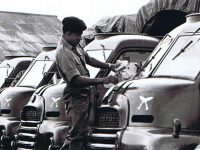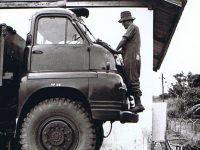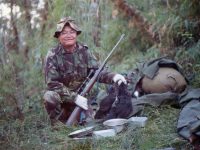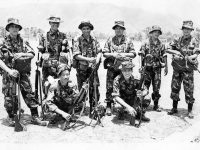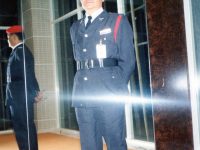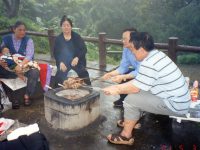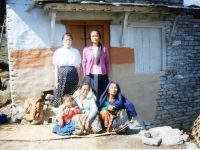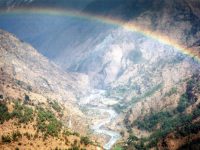Durga Bahadur Pun
Durga Bahadur Pun, Lance Corporal
(Portrait © Gurkha Voices Oral History Project)
Durga was a driver in the Gurkha Transport Regiment in Hong Kong, Singapore and UK during the mid ’60s to 1980.
He drove all types of military vehicles: buses, tanks, land rovers, cars, minibuses and was a personal driver to senior ranks at times. He enjoyed the physical sports offered in the Gurkas such as the swimming and running. After the army he worked in Hong Kong as a security guard. His wife, Tham, and family were able to live with him in Hong Kong too.
Gurkha Stories has been given permission to use the selection of photos below by Jonathan Godwin whose father, Bill, was a Major in the British Army in the 1950/60s with the 31 Squadron, Gurkha Transport Regiment in Sarawak, Hong Kong and Singapore. He was one of the first officers to run the GTR in its early days. Although Durga joined the GTR in 1965/6 the photos depict the environment he would have trained and lived in during his early career with the Gurkhas. Thanks to the Godwin family for the use of these evocative photos of this early era of the Gurkha Transport Regiment.
(More of Durga’s stories are in our book, published later this year. Keep posted via our blog: www.gurkhastories.wordpress.com)
-
Ceremonial Guard
-
Drill Order
-
Fatigue in camp
-
Night Driving Dress
-
PL Drill Order
-
Walking Out
-
Gurkha Transport Regiment c 1960
-
R&R fun, Hong Kong?
-
Hong Kong, 1960s
Interview Extract 1 (based in interpreter's translation):
My date of birth is in 1947, but I don’t even know when I was born! [laughs]. I was born in India, in a place called Assam. My father was in the Indian Army and so after a few years we all went back to Nepal. When they used to recruit you, everyone used to say their age was 18, and I said I don’t know and then they just rounded it up to 18.
We went to the recruitment centre in Paklihawa and they were choosing people district wise. From Paklihawa, to my village of Doba it was a 19, 20 day walk, a long way. Me and my friends, we had to walk seven days to get to Pokhara [midway] and then onto Paklihawa for several days.
My village is quite big, about, 2,000 people. Nowadays there’s facilities and everything there, but before we didn’t used to have electricity or phones. There didn’t used to be anything of that. And then water, we had to fetch it by walking it. There wasn’t any school.
So I was recruited in Paklihawa, and we were meant to go to Sungai Petani in Malaysia, [for training]. But before going there we got delayed in India, because there was a war between India and Pakistan, so we stayed there, and then after that we went to Malaysia.
I was posted to Hong Kong and I used to have border duty from 1969 to 1970. They used to separate us 100 percent [from British soldiers]. They used to have another accommodation and we used to have another accommodation, and they used to have air conditioning and we used to just sleep on the floor. We were only allowed to go outside the camp once a month. And our salaries were a lot less than the British soldiers.
-
Motor cycle training, GTR
-
Fleet maintenance, GTR
-
Vehicle maintenance, GTR
-
Durga on a hunting trip, Nepal (Photo: D. Pun)
-
Durga on military training exercise c. 1969 (Photo: D. Pun)
-
Durga post Army life as security guard post army, Hong Kong
Interview Extract 2 (based in interpreter's translation):
The main reason I came here [UK] is because of the environment in Nepal and all the pollution, and the electricity’s not working and there is water shortage. So that’s why I came to live here.
In Nepal, apart from the environment, everything over there is easier. And even for transport, I can go anywhere I want. I can go to Pokhara, the tourist site, Kathmandu, the capital city, because the language over there is really easy for me to communicate. So I feel really happy back in Nepal. I can go fishing. I can go hunting. I can go drink with my friends.
-
Family holiday. Nepal
-
Family visit to Nepal
-
View from Durga's village
Oral histories: © Gurkha Voices Oral History Project

